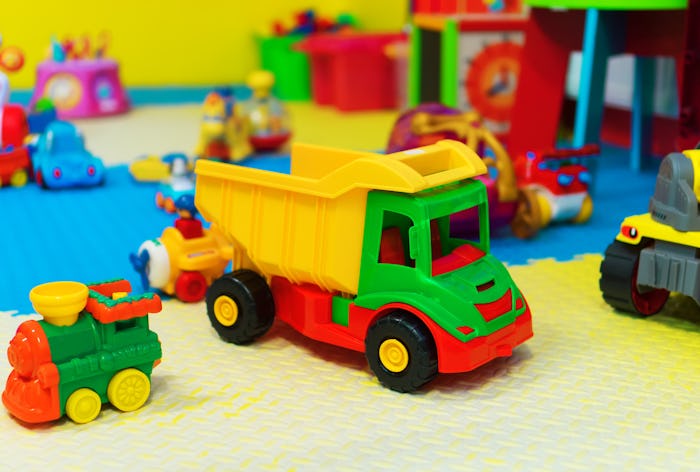Life

Here's An Easy Way To Tell If Your Kids Officially Have Too Many Toys
I love my kids dearly and I’d do anything for them. So when they ask for the latest and greatest toys, I usually give in and buy them. But when spring cleaning comes around and I am forced to prepare multiple bags of barely used toys for donation, I realize just how much junk my kids accumulate and how much I’m to blame for giving in to their every whim. Does my kid have too many toys? Obviously, but what's the limit and how can you tell? If you have mounds of toys laying around the house, you might want to know how to tell if your kid has too much junk to play with, too.
There are a few factors that could hint that you’ve overloaded your home with toys. If your child gets bored easily, asks for new toys regularly, expects you to promptly replace broken toys, or doesn’t play with one toy for more than 15 minutes, it may mean that they have way too many toys, explained teacher turned play therapist Becky Mansfield. On her blog, Your Modern Family, Mansfield noted that having too many toys can be overwhelming for kids, so it might be beneficial to scale back when you can.
Along with costing you an arm and a leg, it turns out that having too many toys may actually negatively impact a child. In a recent study published in Infant Behavior & Development, researchers concluded that when children have fewer toys around them, their playtime tends to be healthier and happier. The study also suggested that fewer toys in a child’s environment can lead to more focused and creative playtime behaviors.
For the study, researchers observed 36 toddlers, ages 18 to 30 months, and placed them in separate playrooms for 30 minutes each. One playroom had four toys in it, while the second had 16 toys. Researchers found that when the children were in the room with more toys, they tended to have shorter attention spans and less focused than the group with less toys. The playroom with only four toys produced kids that were more actively engaged for longer periods of time and played more creatively than the other group.
In a report by Psychology Today, social psychologist Susan Newman, Ph.D, explained that parents need to ask themselves whether or not their child really needs the new toy they are asking for, and gauge whether or not the child will play with it or just toss it away. She suggested that parents invest in activities with their children, rather than material things, because they can provide an opportunity to create a bond, tradition, and memory that kids can look back on and cherish when they are older.
When I was a kid, it felt like my parents kept a reign on how often I could get new toys. A shopping trip to Toys “R” Us was a privilege and a reward, and this approach led me to treasure and appreciate every new toy I got. Now that I have kids, I've found that my parenting style is completely different from that of my parents and I tend to buy my kids almost everything they want because I enjoy seeing them smiling and happy. But I do notice occasionally that despite having tremendously kind hearts, sometimes my kids view getting things they want as a right, rather than a privilege. This attitude is what sets off alarm bells in my head, telling me that I may need to reign in my own overly-generous behaviors.
Everyone’s parenting style is different, so no one can tell you what’s right for your family. Whether your kids have too many toys or too little, what matters is that you provide your child with love, nurturing, and quality time, while teaching them how to be kind, helpful, and respectful human beings. (And maybe how to clean up their playroom.)
Check out Romper's new video series, Bearing The Motherload, where disagreeing parents from different sides of an issue sit down with a mediator and talk about how to support (and not judge) each other’s parenting perspectives. New episodes air Mondays on Facebook.